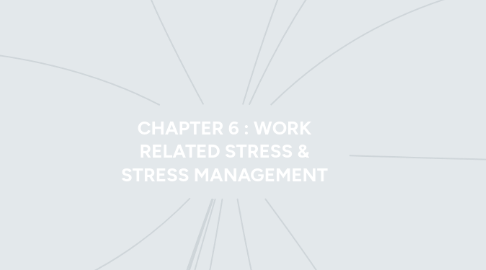CHAPTER 6 : WORK RELATED STRESS & STRESS MANAGEMENT
by shahrul izzat


1. Reduced Personal Accomplishment
2. Cynicism (depersonalization)
3. Emotional Exhaustion
4. Interpersonal and Role Related Stressors
5. Definition of STRESS
5.1. Feeling of tense ,anxious, and worried
5.2. stimulus or response
5.3. Stimulus - some characteristic or event that may result in a disruptive consequence, factor that initiate further actions
5.4. Response - stress as response to some stimulus, called a stressor, reactions, behavior
6. General Adaption Syndrome Model(GASM)
6.1. Alarm Reaction - Occurs when a threat or challenges activates physiological stress response. The individual energy level and coping effectiveness decrease in response to the initial shock
6.2. Ressistance - It activates various biochemical, psychological and behavioral mechanism to overcome or remove the source of stress. The body reduces to the immune system during this stage.- people tend to catch a cold or some other illness when they experience prolonged stress.
6.3. Exhaustion - People have a limited resistance capacity, if the source of stress persists the individual will move into exhaustion stage – increased risk of long term physiological and psychological damage (e.g. job burnout – the process of emotional exhaustion, cynicism and reduced feelings of personal accomplishment)
7. Consequences of Distress
7.1. Physiological - Cardiovascular disease, hypertension, headaches
7.2. Behavioral - Work performance, accidents, absenteeism, aggression, poor decisions
7.3. Psychological - Dissatisfaction, moodiness, depression, emotional fatique
8. Job Burnout Process
9. Managing Work- Related Stress
9.1. 1.Remove the stressor
9.2. 2.Withdraw from the stressor
9.3. 3.Change stress perceptions
9.4. 4.Control stress consequences
9.5. 5.Receive social support
10. Physiological, psychological, and behavioral consequences
11. What are Stressors?
11.1. Stressors are the causes of stress - any environmental condition that places a physical or emotional demand on the person
11.2. Some common workplace stressors include:
11.2.1. Harrassment an incivility
11.2.2. Work overlord
11.2.3. Low task control
12. A.Psychological Harassment
12.1. Repeated and hostile or unwanted conduct, verbal comments, actions or gestures, that affect an employee's dignity or psychological or physical integrity and that result in a harmful work environment for the employee.
13. B.Sexual Harrasment
13.1. Sexual harassment in the workplace increases absenteeism and turnover and lowers workplace productivity and job satisfaction
13.2. Unwanted conduct
13.2.1. The behaviour or things said must be unwanted. A gesture can be unwanted even if the employee does not protest out loud.
14. C.Work overload and Task control stressors
14.1. Work overload stressor
14.1.1. 1. Working more hours, more intensely than on cope
14.1.2. 2. Affected by globalization, consumerism, ideal worker norm
14.2. Task control stressor
14.2.1. 1. Due to lack of control over how and when tasks are performed
14.2.2. 2. Stress increases with responsibility
